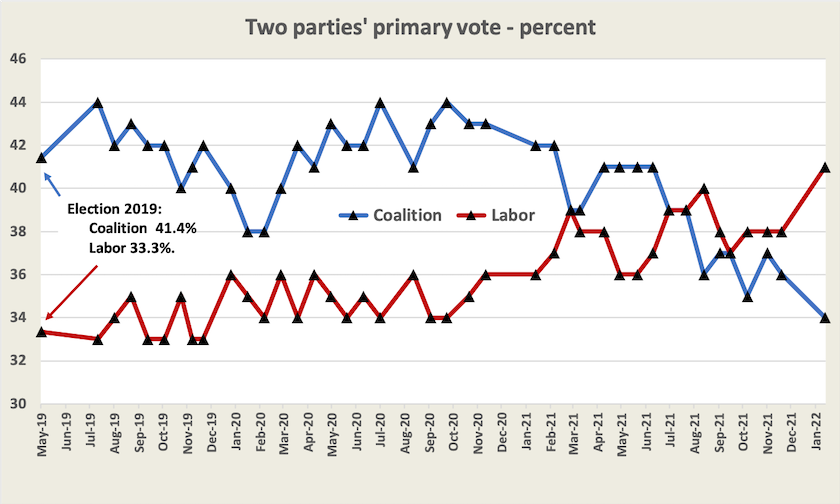Polls and elections
Newspoll
The Newspoll two-party result (56:44 in Labor’s favour) has commanded a great deal of media attention. Two-party estimates involve many assumptions and sampling errors: it’s safer to focus on the main parties’ primary vote, shown in the graph below. For 15 months the Coalition has been falling behind Labor.

Coalition parliamentarians take comfort in knowing that this compares with the situation in September 2018, just after the Dutton-Morrison coup, when the two-party Newspoll result was 56:44, on almost identical primary figures. Subsequently they scraped home in the 2019 election.
There the similarity ends, however. They had 8 months to close that gap: now they have only 3 months. Before the coup there had already been a slow drift away from Labor to the Coalition (as Malcolm Turnbull reminds us): the trend now is against the Coalition. And in 2018 to most voters Morrison was an unknown entity: Laura Tingle points out that in 2022 “Scott Morrison's problem is that they do know who he is”.
Portugal’s election
In Portugal the Socialist Party won the country’s election held last Sunday. After having governed in minority, in a swing of 6 percent they won 42 percent of the vote, enough to pick up 9 more seats, giving them a single-seat majority in the 230-seat Assembly. The Social Democrats, a party ideologically closer to European Christian democrats than to traditional social democrats, came second with a swing of 2 percent, and 29 percent of the vote.
At first sight this looks like a decisive win for the Socialists, but in terms of ideologies there was not much change in the left-right balance. There was a 5 percent swing against the Marxist “Left Bloc” and a 2 percent swing against the Communists, matched by a 7 percent gain by the populist right-wing “Chega” (”Enough”) Party.
With a single-seat majority the Socialists are in the position Australia’s Coalition found itself in after the 2019 election, and which Labor could occupy later this year. To now the Portuguese Socialists have had to negotiate support from minor parties to get legislation through the Assembly (rejection of their budget having precipitated this early election). Will they now ignore the other parties, as Australia’s Coalition did, or will they hold to Prime Minister António Costa’s word: “An absolute majority doesn't mean absolute power. It doesn't mean to govern alone”?